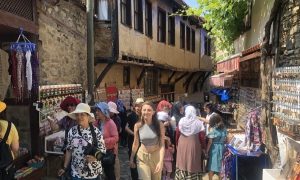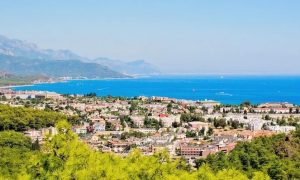With the globalimmigrantsWith the ever-changing trends, Turkey, with its favorable geographical location, rich cultural background and relatively liberal immigration policies, has become the immigration target for more and more people from abroad. For those who want to settle or invest in Turkey, it is crucial to understand Turkey's immigration policies, property purchase procedures, tax system and cost of living. This article will provide you with the 2025Turkish immigrantsA comprehensive guide to applying, including a detailed analysis of home buying, taxes and cost of living to help you be well prepared.
I. 2025Turkish immigrantsPolicy overview
The Turkish government has always welcomed foreign investors and their family members to obtain permanent residency in Turkey by purchasing a house, investing in a business, or making bank deposits. The following are some of the main ways of immigration:
-
home purchase immigration
One of the most popular routes to immigration in Turkey is obtaining permanent residency by purchasing a home. According toTurkish immigration policyThe foreign investor is only required to purchase at least $600,000 The Turkish citizenship can be applied for by purchasing a property in Turkey and holding the property for at least three years. In addition, the buyer will not only enjoy stable asset appreciation, but also have the opportunity to receive rental returns. -
business investment
Creating jobs by opening a company or making an investment in Turkey is also a common way to immigrate. The investment amount usually required is not less than Half a million dollars.This route is suitable for those investors who wish to start a business or entrepreneurial activity in Turkey and are able to provide a certain number of jobs. This route is suitable for investors who wish to start business activities or entrepreneurship in Turkey. -
bond investment
Foreign investors can purchase Half a million dollars. or more in Turkish government bonds to fulfill the investment requirements to qualify for permanent residence in Turkey. This type of investment is relatively simple, but the returns are usually low, making it suitable for immigrant applicants who are looking for a low-risk investment. -
a bank account
Turkey's bank deposit program requires applicants to place at least Half a million dollars. Deposit in a Turkish bank and hold for three years. While this is the most direct way, the returns are relatively low and not suitable for all investors.
Second, 2025 Turkey home purchase immigration policy interpretation
Home purchase migration is one of Turkey's core policies to attract foreign investment.2025, the Turkish government has tightened the regulation of the real estate market and the conditions and procedures for home purchase migration have been adjusted.
-
Purchase amount requirement
Under the 2025 policy, foreign investors will be required to purchase at least one million dollars worth of $600,000 of the property and hold the property for at least three years. Buyers can also choose multiple properties, as long as the value of a single property meets the required criteria. Investors can choose from a variety of property types such as residential, commercial real estate or office buildings. -
return on investment
Turkey's real estate market has grown steadily in recent years, especially in major cities such as Istanbul, Ankara and Izmir, where the potential for property appreciation is high. Many investors choose to buy properties and rent them out to generate rental returns. In addition, the potential of the real estate market is such that many investors choose to hold their properties for the long term in anticipation of future appreciation. -
legal protection
The Turkish government's legal protection of foreign investors is relatively well established and ensures the transparency and legality of the purchase process. All purchase transactions need to go through a Turkish notary public to ensure that the rights and interests of both parties are not violated. In addition, the Turkish government provides convenient tax policies and legal support for migrant property buyers.
III. Analysis of the Turkish tax system
Immigration to TurkeyAfter, understanding the local tax system is crucial for planning personal finances and business operations. The Turkish tax system includes a variety of aspects such as personal income tax, corporate tax, and value added tax (VAT).
-
personal income tax
Personal income tax in Turkey is based on a progressive tax system with rates ranging from 15% to 40%. The application of the tax rate depends on the individual's annual income level. For immigrants, if you reside in Turkey for more than 183 daysIf you are a resident of Turkey, you are considered a tax resident and are subject to tax under Turkish tax law. If your sources of income include foreign income, you may be subject to tax treatment under a double tax treaty. -
corporate tax
The corporate tax rate in Turkey is usually 22%, but specific tax rates may vary depending on the industry and size of the company. If you are planning to open a company or invest in a business in Turkey, it is crucial to understand the tax incentives in Turkey. Turkey offers certain tax breaks and subsidies to foreign businesses to boost the economy. -
Value Added Tax (VAT)
The VAT rate in Turkey is usually 18%However, certain goods and services may be subject to a lower rate (e.g., 8% or 1%). For foreign investors, understanding Turkey's VAT regulations is crucial for cross-border transactions and business operations.
-
property tax
Property taxes are levied on real estate in Turkey, usually at rates ranging from 0.11 TP3T to 0.31 TP3T per annum.In addition, a capital gains tax may be involved in the sale of the property, depending on the length of time the property has been held.
IV. Cost of living analysis in Turkey
The cost of living in Turkey is relatively low compared to the cost of living in Western Europe and North America. Especially in major cities such as Istanbul and Antalya, the standard of living is higher, but overall consumption remains more affordable. Below are a few key aspects of the cost of living in Turkey:
-
Housing costs
Housing costs in Turkey are relatively low, especially in cities outside of Istanbul. Depending on the city, rent and purchase prices in urban areas vary widely. For example, in the center of Istanbul, the monthly rent may be 2000-4000 TL(approx. $100-$200). And in smaller cities or suburbs, rents are cheaper. -
Food and daily expenses
Food and daily expenses are relatively low in Turkey. Buying local ingredients and eating out are cheaper than in Europe and the United States. Monthly food expenses are generally 2000-3000 Turkish Lira(approx. $100-150).
-
Transportation and communications
Public transportation in Turkey is relatively inexpensive, with metro and bus fares within the city typically costing 5-10 Turkish lira(approx. US$ 0.2-0.5). The cost of cell phone communication and Internet is also relatively low, with monthly costs of about 100-200 Turkish lira(approx. 5-10 dollars). -
Health and education
Turkey's healthcare system is gradually modernizing, and while public hospitals are cheaper, private hospitals or international clinics are more comfortable and slightly more expensive for expatriates. In terms of education, international and private schools in Turkey charge higher fees, but are generally lower than in Europe and the US.
V. Conclusion
In 2025, Turkey remains a popular destination for migrants, especially through theinvestment immigrationThe way of providing a wealth of choices. As the most common way to purchase a home, immigrants can not only enjoy the beautiful living environment of Turkey, but also realize the value of assets. With a relatively liberal tax regime and affordable cost of living, Turkey is an ideal place for expatriates to settle. If you are consideringImmigration to TurkeyIt is important to be fully aware of the policies, taxes, and cost of living to prepare for your immigration journey and to enjoy all the benefits of this cross-cultural country of opportunity.






